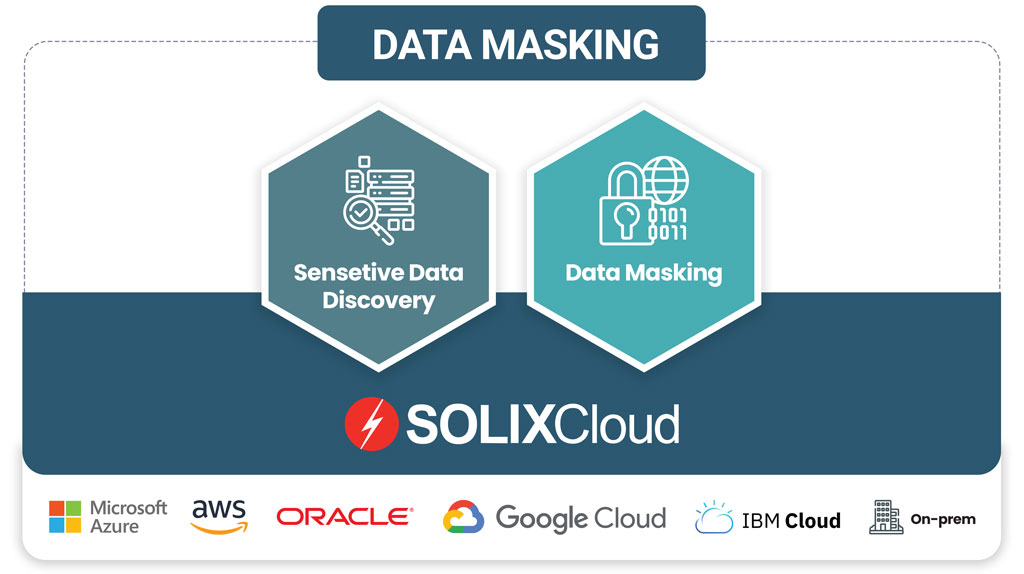
Data Security Challenges in Non-Prod Environment
Non-production environments serve as the playground for the software development lifecycle, where applications are developed, tested, validated, and simulate real-world scenarios before being released into a live or production environment. Traditionally, data security prioritization has emphasized production environments, leaving the non-production domain vulnerable.
Studies indicate that non-production environments encompass about 80% of an enterprise’s potential entry points for attackers regarding endpoints, data openness, and privileged user accounts. This underscores their vulnerability and ease of data breaches. The blog navigates you through various data security challenges and how solutions like SOLIXCloud Data Masking could safeguard your non-production data.
Challenges in Data Security
Despite their importance to the software development lifecycle, they often contain sensitive information, including personally identifiable (PII) or proprietary business data. Studies show that 20-25% of breaches stem from non-production areas worldwide, exposing millions of records and stressing the need for a thorough grasp of data security challenges.
Access Control and Permissions: The principle of least privilege is always a necessary consideration for developers and testers, as well as in production environments. Outdated software, weak access control, vague identity management, unplanned decommissioning, etc., further elevate vulnerability.

Access control and permissions: These are critical for data security in non-prod environments, which often replicate production data for testing and development. This leads to vague segmentation and an increased risk of unauthorized access. Developers and testers with broader permissions and shared or temporary accounts further complicate tracking and increase unauthorized access risks.
Governance and Compliance: Maintaining data integrity and compliance across multiple non-production environments is a persistent challenge. This gap can result in non-compliance with GDPR, HIPAA, and PSD2 regulations, leading to fines and other legal consequences.
Third-party risks: Third-party vendors are crucial for software development, but their access to non-production environments poses security risks. Improper visibility, data misuse potential, and other attacks are significant worries.
Balancing Functionality with Security: Securing sensitive data involves maintaining a delicate equilibrium between ensuring data security and allowing sufficient access for testing and development activities.
AI Integration: Integrating AI tools seamlessly into existing non-production workflows can be complex. Malicious actors can exploit AI models’ data deidentification or anomaly detection vulnerabilities to manipulate test data or bypass security.
Industry Best Practices
When it comes to data security, fight fire with fire. Safeguarding data in non-production environments requires a comprehensive approach that addresses various security challenges.
Data Discovery Tools: Using sensitive data discovery tools to understand your attack surface area could elevate risk management strategies and overall data governance initiatives.
Data Security Tools: Uncovering known and unknown IT assets isn’t just enough without a proper data security tool. Data masking is a perfect solution for the above. When done right, masking obfuscates sensitive information without affecting the usability of test data.
Access Management: Implement strict access controls and regularly review permissions to ensure only authorized personnel can access non-production data.
AI Governance: Establish a robust AI governance policy to secure your AI models and the trained data by understanding your AI exposure, ensuring security across the pipeline, and investing in defense strategies.
Apart from the above solutions, strategies like data minimization, data encryption, data retention, incident response planning (IRP), and providing comprehensive employee training on the best data security practices can elevate your data security landscape.
About SOLIXCloud Data Masking:
SOLIXCloud Data Masking emerges as a pivotal solution in today’s data-centric era, specifically tailored to address the challenges associated with data utilization in non-production environments. Solix’s comprehensive masking capabilities combined with sensitive data discovery act as a safeguard, discovering and protecting sensitive information to allow organizations to confidently share and use their data without compromising its integrity or revealing sensitive information.
SOLIXCloud Data Masking is a fit-for-purpose data security tool with a wealth of capabilities, including high-performance masking, broad support for repository and data types, customizable rules and patterns, preserved format and data integrity, a wide range of masking techniques, optional discovery-led protection, comprehensive reporting, regulatory compliance, multi-cloud and SaaS support, cost savings, and more.
Take the first step towards securing your non-production environments by downloading our ebook, “A Guide to Data Security and Data Privacy in Non-Production and Analytical Environments.”
Vishnu Jayan is a tech blogger and Senior Product Marketing Executive at Solix Technologies, specializing in enterprise data governance, management, security, and compliance. He earned his MBA from ICFAI Business School Hyderabad. He creates blogs, articles, ebooks, and other marketing collateral that spotlight the latest trends in data management and privacy compliance. Vishnu has a proven track record of driving leads and traffic to Solix. He is passionate about helping businesses thrive by developing positioning and messaging strategies for GTMs, conducting market research, and fostering customer engagement. His work supports Solix’s mission to provide innovative software solutions for secure and efficient data management.





